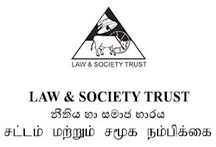Press release
June:2017
IN MEMORIAM: Justice P.N. Bhagwati (21 December 1921 – 15 June 2017)
The Law & Society Trust (LST) condoles the passing away of Justice Prafullachandra Natwarlal Bhagwati, former Chief Justice of India and a former Member of the Board of Directors of LST. Justice Bhagwati contributed with great distinction to human rights law and jurisprudence as a judge and jurist as well as through his work with the United Nations, including as Chair of the United Nations Human Rights Committee, and other international bodies.
Justice Bhagwati was also Chair of the International Independent Group of Eminent Persons (IIGEP) constituted in February 2007 by then President Mahinda Rajapakse to monitor the work of a Commission of Inquiry (the Udalagama Commission) appointed by the President to investigate and inquire into 16 incidents of alleged serious violations of human rights since August 1, 2005. But just over a year later, rather than legitimise a flawed process of investigation Justice Bhagwati led the termination of the IIGEP itself, noting that “the proceedings of inquiry and investigation have fallen far short of the transparency and compliance with basic international norms and standards pertaining to investigations and inquiries.” Many of the IIGEP’s observations regarding the climate of impunity and failures of the justice system and investigative agencies remain disturbingly pertinent even today.
Justice Bhagwati’s contribution to the advancement of human rights jurisprudence is widely recognised. In particular, his commitment to enhancing access to justice through public interest litigation and judicial activism, which he pioneered alongside Justice V.R. Krishna Iyer, has left a profound impact on jurisprudence the world over. His time on the Supreme Court also spanned the turbulent 21-month state of Emergency between June 1975 and March 1977. Decades later, he regretted siding with the majority in the infamous A.D.M. Jabalpur vs Shivkant Shukla decision in 1976 in which the Supreme Court over-ruled nine High Courts and agreed with the executive that judicial remedies such as habeas corpus did not apply to preventive detentions under the state of Emergency.
It is for his belief that “the court has to innovate new methods and devise new strategies for the purpose of providing access to justice to large masses of people who are denied their basic human rights” (in S.P. Gupta vs Union of India) that Justice Bhagwati is however best remembered. This approach along with his commitment to constitutionalizing social justice is invaluable in guiding not only judicial thinking and legal activism but also Constitution making in Sri Lanka today.
LST joins the wider human rights fraternity in India, Sri Lanka and around the world in paying homage to Justice Bhagwati and recalling his many distinguished contributions to the cause of justice, rule of law, and human rights.

